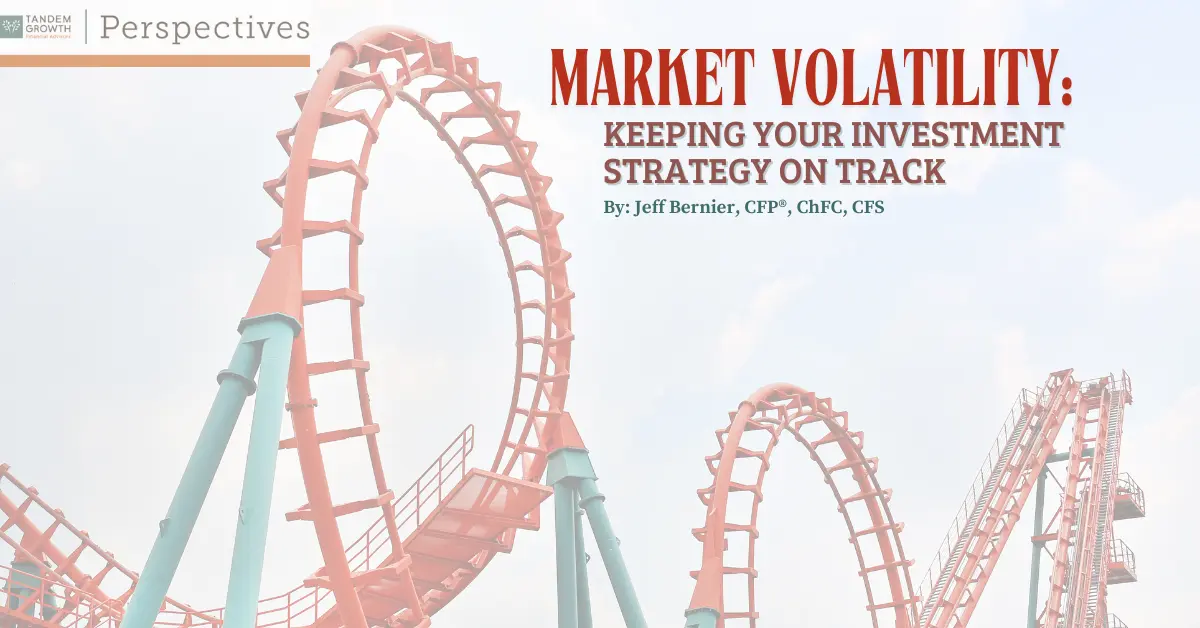
By: Jeff Bernier, CFP®, ChFC, CFS
During your investing journey, you’ll inevitably face periods of market volatility. These fluctuations can prompt you to second-guess your investment strategy or consider alternative approaches to managing your finances. However, it’s crucial to maintain focus on your overarching goals, time horizon, and risk tolerance, regardless of the market’s current performance.
Understanding Market Cycles
While market downturns can be unsettling, taking a broader view can be helpful. Since 1926, the U.S. Stock Market has experienced 25 bear markets, each lasting an average of only 9.5 months. Over this time, a dollar invested would have grown to almost $17,000.[i] Despite current market volatility, the best advice might be the simplest: step back, see the big picture, and avoid making rash decisions. It’s natural to question your investment strategy when the market becomes turbulent.
Here are some insights to help you remain calm and focused:
- Tune Out the Noise
In today’s media landscape, opinions are abundant and often contradictory. Financial news, investment websites, and social media can become overwhelming. Fortunately, you have a dedicated financial advisor who helps ensure your custom financial plan drives your investment strategy. Your investment portfolio was selected with a structured and data-driven approach backed by decades of research. Your short-term portfolio is utilized for distributions to help mitigate risk of day-to-day volatility and hopefully allow you to disregard the noise.
- Resist Emotional Reactions
Market volatility can play havoc with your emotions, tempting you to make hasty decisions. However, successfully timing the market is virtually impossible and turns a high probability endeavor into a “risky” bet. Market trends rarely follow a straight upward path and are more like a dance: two steps forward, one step back. What appears as a peak may be a mere correction en route to new highs. Resist the urge to react emotionally, and remember that turbulence is a part of the investment journey.
- Focus on the Long Term
Short-term fluctuations can provoke anxiety and lead to unwise decisions. Whenever possible, step back and take the long view. Are you investing for 10, 20, 30, or 40 years? Sound investment strategies typically outlast periods of volatility, which often span only days, weeks, or months. While past performance isn’t an indicator of future trends, it can provide insights. The S&P 500 has delivered an average annual return of 10.38% since 1926.[ii]
- Maintain Perspective
Stock markets naturally fluctuate, and downturns are simply part of their nature. Instead of reacting, take a deep breath and stay calm. Monitoring the market too closely can cause unnecessary stress. For your peace of mind, find ways to relax and de-stress during volatile times.
- Be Prudent
While market volatility shouldn’t prompt you to ignore your finances, it’s important to remain prudent. A flexible investment strategy allows you to seize appropriate opportunities aligned with your risk tolerance, time horizon, and goals. Partnering with your financial advisor ensures that your money works for you in the long term, regardless of market movements.
Reflecting on Recent Market Volatility
Consider the market volatility in the fourth quarter of 2018 as an example. Despite economic optimism following the Tax Cuts and Jobs Act, market volatility picked up in September. Rate hikes and policy shifts contributed to fluctuations, yet the market quickly regained footing with renewed trade talks and policy flexibility.
Looking Ahead
The future of the market is uncertain, and bouncing trendlines are not necessarily indicators of doom or opportunity. Instead, they are part of the investing lifecycle. With a strategy in place, market movement can be anticipated, not feared. If you have experienced recent life changes or wish to discuss your portfolio, please do not hesitate to reach out to your TandemGrowth advisor. We are here to serve you.
Please note that this blog is provided for informational and educational purposes only and should not be considered a substitute for professional financial advice. TandemGrowth Financial Advisors, LLC (“TandemGrowth”) is a registered investment adviser. While the information presented is believed to be factual and up to date, TandemGrowth does not guarantee its accuracy and it should not be regarded as a complete analysis of the subjects discussed.






